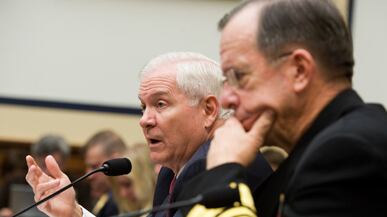Pentagon civilian leaders and the military brass see nothing but trouble looming as the Obama administration takes one step after another into the Libyan morass. The next step appears to be arming the Libyan rebels, a move that would inevitably entail pressures to send U.S. trainers and even more potent arms—and a move that Defense Secretary Robert Gates flat-out rejected in testimony before Congress on Thursday. “What the opposition needs as much as anything right now is some training, some command and control, and some organization,” Gates said. As for providing weapons, that is “not a unique capability for the United States, and as far as I’m concerned, somebody else can do that.”

Military officials also have slim sympathy in general for those who advocate U.S. combat operations for humanitarian missions, when other nations and other means should be leading such efforts. And with surging demands to cut the Pentagon budget, Pentagon brass aren't thrilled with the more than $500 million tab for the extra operations over Libya. Despite these concerns, Pentagon leaders have been saluting in public, hoping their private warnings will be sufficient to prevent deeper involvement.
White House officials find Pentagon alarms misplaced. One insisted Thursday that "by Saturday we will have handed off fully to partners." By that, officials mean that U.S. jet fighters won't be flying combat operations over Libya. That task will fall entirely to NATO partners such as Britain, Canada, France, Norway, and Denmark with still ill-defined flights by the United Arab Emirates and Qatar.
But Pentagon officials and many others in the administration are not comforted entirely by this. To them, the fight to protect Libyan civilians (meaning mostly rebel civilians) is still very much on. British and U.S. subs launched cruise missiles to destroy air defense systems, and that's mostly accomplished. U.S. aircraft took the lead in junking a good chunk of the Libyan Air Force and launched devastating attacks against Libyan tanks, artillery, and other ground forces. Despite the severity of these attacks, Libyan forces survived, regained the offensive, and are now moving back toward rebel strongholds in eastern Libya. And the expectation of U.S. intelligence is that without having to face U.S. air power, Gaddafi's troops will build further momentum. So, U.S. military officials haven't stopped worrying about being dragged yet again into the air war. Nor do they expect political pressure from abroad to vanish when it comes to the original goal of saving rebel lives. Not to be forgotten, U.S. military assets, particularly command and control capabilities such as radar-jamming and other communication tools, will continue to play a critical role in all coalition air operations.
Pressures to do more and more will continue to lurk. All the Pentagon can do, then, is to raise tough questions.
Of course, there is the new concern about providing arms to the rebels. The United Nations mandate for doing this is ambiguous, at best, and many nations argue that this would be an uncalled-for intervention in what many believe to be a civil war rather than a genocidal one. The White House and its coalition partners respond that it certainly would have been genocidal if they had failed to intervene. Nonetheless, the arms provisions would add a new dimension. In the first place, a number of officials assert that despite the fact that Washington has not made a formal decision to supply weapons to the rebels, they have been receiving small arms for some weeks now. Some officials think that Arab states, not desirous of public attention, have surreptitiously supplied the arms. Others insist the supply line has been American, official or unofficial.
In any event, if Gaddafi's troops continue to rout the rebels, outside arms will flow plentifully. At that point, escalatory reality takes hold once again. The rebels won't be able to use most arms, even relatively simply ones like anti-tank rockets and rifles, without extensive training. The White House might be tempted to ask for help from the ultra-secret U.S. special operations forces. These impressive commandos are not subject to the same Congressional approval process as CIA operatives. The commandos can be dispatched more or less on the president's orders. The Pentagon will resist, and the best bet is that Obama will use C.I.A. personnel.
Remember, underneath everything happening now are the two driving goals that President Obama set: to protect populations and to oust Colonel Gaddafi. In all likelihood, U.S. coalition partners cannot achieve these goals without U.S. jets resuming combat missions. Even with more U.S. air power, it probably won't be possible to stop Gaddafi without using some coalition ground forces. So, pressures to do more and more will continue to lurk. All the Pentagon can do, then, is to raise tough questions (Who are those rebels we're determined to help, could they be Muslim extremists?) to diffuse pressures on the U.S. military to do more.
In support of the Pentagon case, it might be worth noticing the big dog that hasn't barked—Vice President Joe Biden. Here we are, weeks into the Libyan "crisis," and this avid foreign policynik has not uttered one word. His staff says he's the point person on the budget right now, that he can't do everything, and that he doesn't need to because President Obama and Secretary Clinton are front and center publicly on this. Don't be surprised if Biden breaks his silence soon. Whatever Biden will say, don't expect officials throughout the administration and especially in the Pentagon to stop worrying about Libya's slippery sands. Next time, Obama should make himself count to one million before he sets absolutists goals like "Gaddafi must go," and "We must protect civilian lives."
Leslie H. Gelb, a former New York Times columnist and senior government official, is author of Power Rules: How Common Sense Can Rescue American Foreign Policy (HarperCollins 2009), a book that shows how to think about and use power in the 21st century. He is president emeritus of the Council on Foreign Relations.






